Written by:
Last Updated:
Humanist weddings are personalized, non-religious ceremonies centred on the couple’s story and values, offering flexibility to include elements like personalized vows and meaningful rituals.
Unlike traditional ceremonies, these are crafted by celebrants to reflect individual personalities and values.
This approach allows couples to celebrate their union in a manner true to their beliefs and preferences, albeit with additional planning required in regions lacking legal recognition for humanist ceremonies.
Humanist weddings are celebrated for their openness and inclusivity, embodying principles that welcome couples from all walks of life, including those in the LGBTQI+ community.
This inherent inclusivity ensures that every ceremony can be a genuine reflection of the couple’s unique story, values, and identity, free from the constraints of traditional or religious norms that may not align with their personal beliefs or circumstances.
Head to our Unity wedding ceremony ideas post for some unique ways to add to your humanist wedding ceremony.
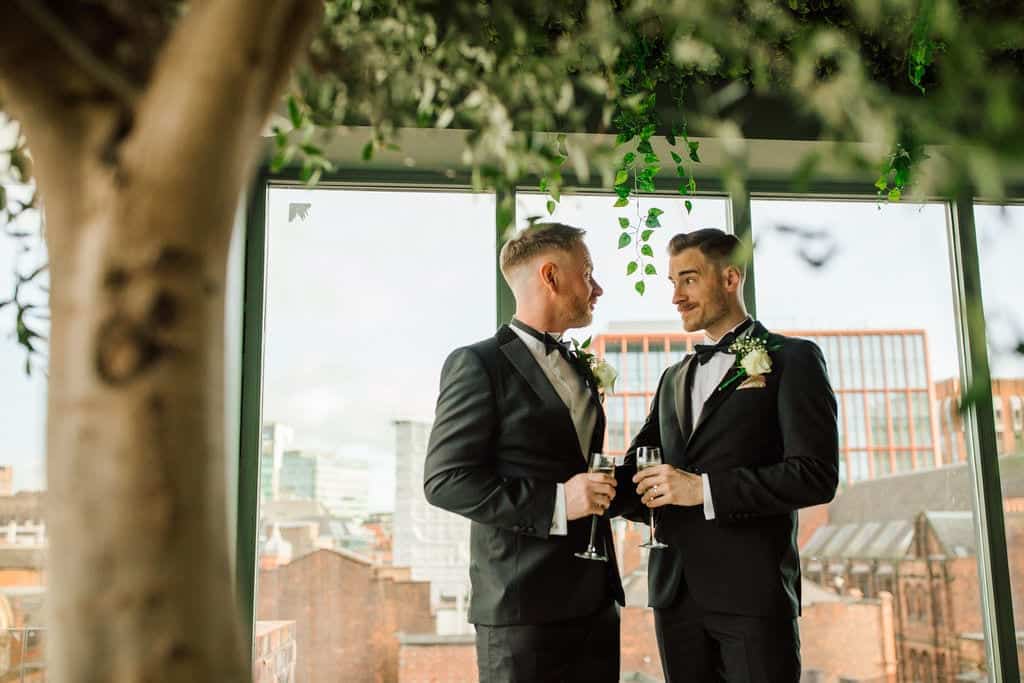
MEET THE EXPERT
Karen Hewitt is a wedding celebrant based in Manchester, UK. As a Humanists UK celebrant, she is fully trained and able to guide you through your choices to create a special wedding ceremony that is bespoke and perfect for you.
Planning Your Humanist Wedding
Planning a humanist wedding opens up your possibilities and means you can create a truly personal wedding.
They are deeply personal, reflective of the couple’s values and stories, and free from the constraints of traditional or religious ceremonies.
By focusing on what truly matters to you, and with the guidance of an expert celebrant, your humanist wedding can be a profound and heartfelt celebration of your love.
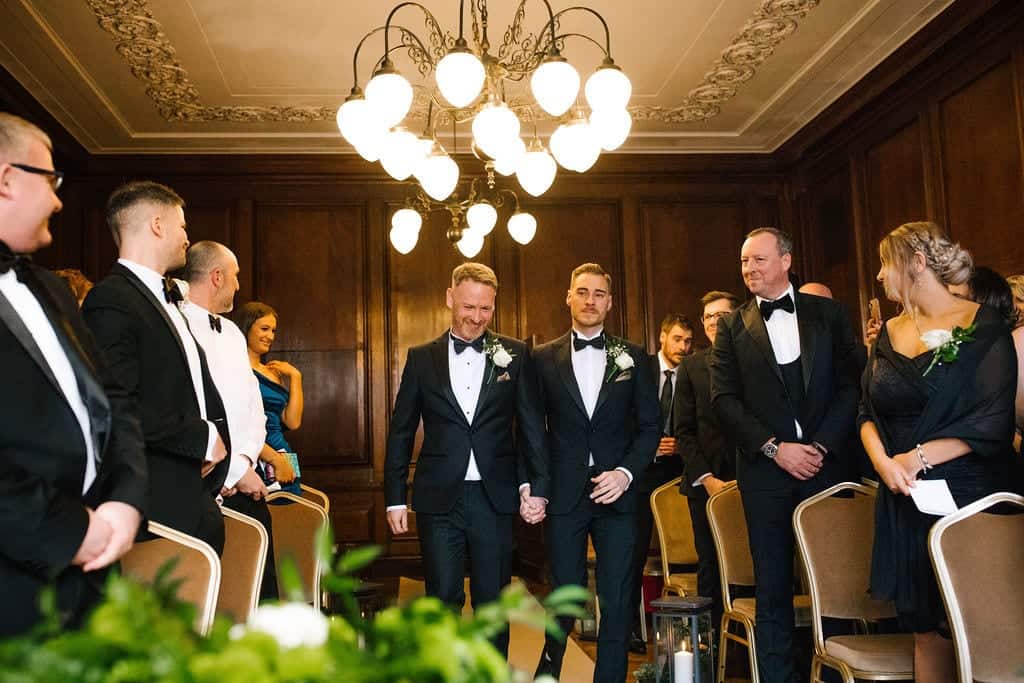
Finding a Celebrant
Choosing the right celebrant is crucial for a humanist wedding. Karen Hewitt emphasizes the importance of selecting a celebrant who not only aligns with your values but also understands your unique story.
“Finding a celebrant who resonates with your beliefs and vision for your day ensures that your ceremony will be a true reflection of you as a couple,” Hewitt advises.
To find a celebrant, couples should look for individuals accredited by recognized humanist organizations, such as Humanists UK, and conduct interviews to ensure a good personal fit.
Incorporating Tradition and Values
Blending traditional elements with personal interests or novel concepts can make your ceremony uniquely yours.
Karen Hewitt suggests, “Don’t be afraid to mix traditional elements with aspects that are uniquely you. Whether it’s a traditional exchange of rings, or something as unique as a themed ritual that reflects your shared interests, your wedding should celebrate your individuality as a couple.”
This approach allows couples to honour their heritage or cultural traditions while also making space for their personal narratives and interests to shine through.
Humanist ceremonies are popular for pagan weddings, tying the pagan beliefs and the bespoke choices of celebrant weddings.
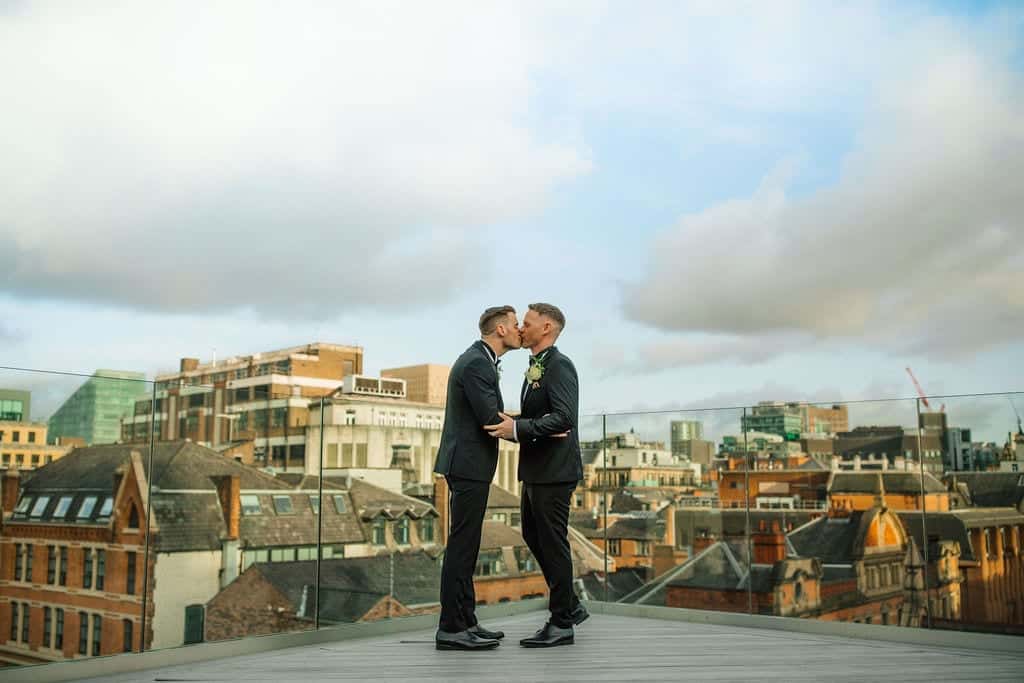
Choosing your Humanist wedding venue
Humanist celebrant Karen Hewitt might suggest,
“Choose a location that not only speaks to your heart but also reflects the values you hold dear as a couple. Let the setting of your wedding be as meaningful as the vows you exchange.”
This freedom of choice in venue underscores the personalized nature of humanist weddings, making the ceremony even more special and memorable for the couple and their guests. Here are some things to consider when choosing your location and venue:
- Personal Significance: Opt for a location that resonates with your story. Whether it’s where you first met, a shared favourite spot, or somewhere that reflects your shared interests or dreams, let the venue speak to your journey together.
- Guest Considerations: Think about the accessibility, comfort, and experience of your guests. The setting should accommodate the size of your guest list and be accessible to everyone, including those with mobility issues.
- Logistics and Permissions: Ensure the chosen location is practical for a wedding ceremony. Outdoor and unconventional venues might require permits, so check local regulations early in the planning process.
Tips for Outdoor Ceremonies
- Weather Plan: Always have a contingency plan for adverse weather. Consider renting tents or having an indoor backup option nearby.
- Amenities: Ensure there are sufficient facilities for your guests, such as restrooms and seating. If the venue lacks these, you may need to rent additional equipment.
- Nature and Décor: Embrace the natural beauty of your outdoor setting by minimizing additional decorations. Use the surroundings to enhance the atmosphere of your ceremony.
- Acoustics: Outdoor settings can be challenging for sound. Use microphones and speakers to ensure all guests can hear the ceremony, especially in windy conditions or spacious areas.
- Timing: Consider the time of day and the lighting it will provide. Sunset ceremonies can offer a stunning backdrop but require precise timing and lighting considerations for photography.
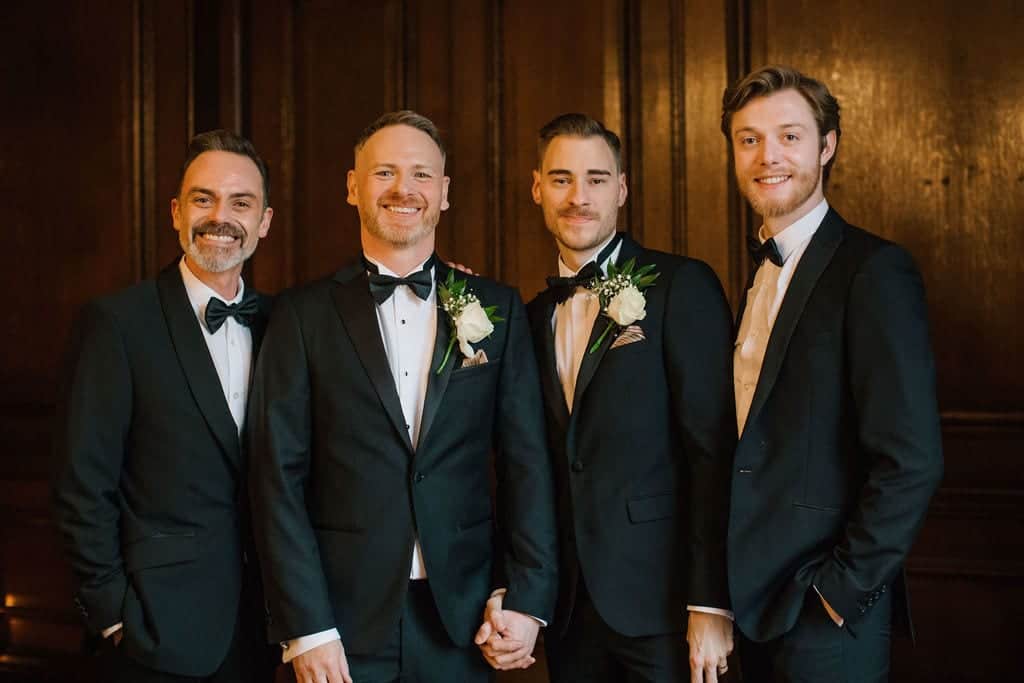
Creating Your Humanist Ceremony
A humanist ceremony offers the flexibility to include elements that are uniquely meaningful to you.
According to Karen Hewitt, “Your ceremony should be a reflection of your journey together, incorporating elements like personalized vows, readings, and rituals that hold special significance.”
Whether it’s handfasting to symbolize the binding together of your lives, lighting a unity candle as a representation of your combined love, or creating entirely new rituals that reflect your personal story, the key is customization. Hewitt encourages couples to think creatively and personally. Head to our unique unity wedding ceremony ideas post.
Ceremony Structure Guide:
- Processional: The entry can be traditional or completely unique, with either partner walking in first, together, or with family members or friends. Music, silence, or even a performance could mark this moment.
- Welcome and Introduction: The celebrant, like Karen Hewitt, might begin by acknowledging the guests and explaining the significance of a humanist ceremony, setting the tone for what’s to come.
- Readings and Music: Choosing readings and music that resonate with your values adds a personal touch. These can be performed by guests, offering a way to involve your loved ones directly.
- The Story of the Couple: A hallmark of humanist ceremonies, where the celebrant shares the journey and love story of the couple, emphasizing the personalized nature of the event.
- Rituals: Handfasting, lighting a unity candle, or creating a new ritual that symbolizes your union. Karen Hewitt suggests incorporating elements that “represent your past, present, and future together.”
- Vows and Ring Exchange: Couples can write their own vows, expressing their commitments in their own words. The ring exchange can follow, symbolizing the promises made.
- Closing Remarks: The celebrant wraps up the ceremony, reflecting on the significance of what has been celebrated and looking forward to the couple’s future together.
- The Kiss and Recessional: The ceremonial kiss marks the conclusion, followed by the recessional, which can be as traditional or as unconventional as the processional.
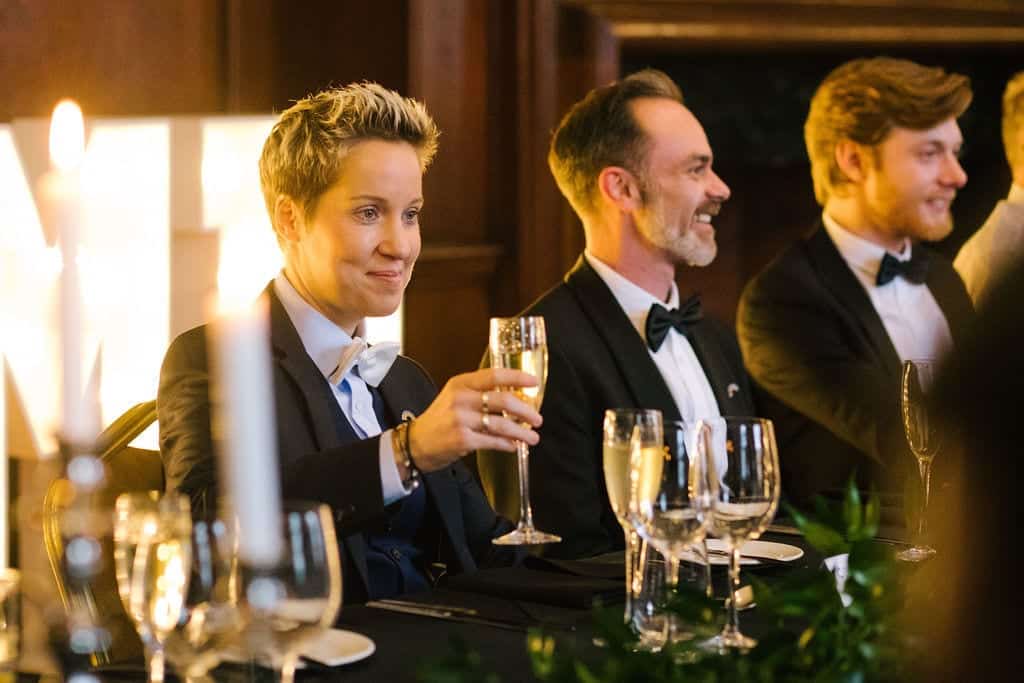
Involving Guests in the Ceremony
- Interactive Rituals: Consider rituals where guests can actively participate, like passing the rings through the guests for blessings or writing wishes for the couple.
- Group Readings or Songs: Choose a piece that everyone can read or sing together, fostering a sense of community and shared joy.
- Role Assignments: Beyond readings, guests can be involved in various roles, such as ceremony musicians, guest photographers, or even leading a short segment of the ceremony that reflects a shared interest or hobby with the couple.
Are Humanist Weddings Legal?
The legal recognition of humanist weddings varies significantly across regions, impacting how couples should approach ensuring their marriage is legally recognized.
In Scotland, Northern Ireland, Jersey, and Guernsey, humanist weddings are legally recognized. This means couples can have a single ceremony that both celebrates their union in a way that reflects their values and beliefs and also legally marries them, without the need for a separate civil ceremony.
However, in England, Wales, and the Isle of Man, humanist weddings are not legally recognized as marriages.
Couples in these locations who choose to have a humanist ceremony will also need to have a separate civil ceremony to ensure their marriage is legally recognized. This civil ceremony typically involves a straightforward registration process at a local registry office and can be done either before or after the humanist ceremony.
The civil ceremony ensures that the marriage is legally binding and recognized by the government.
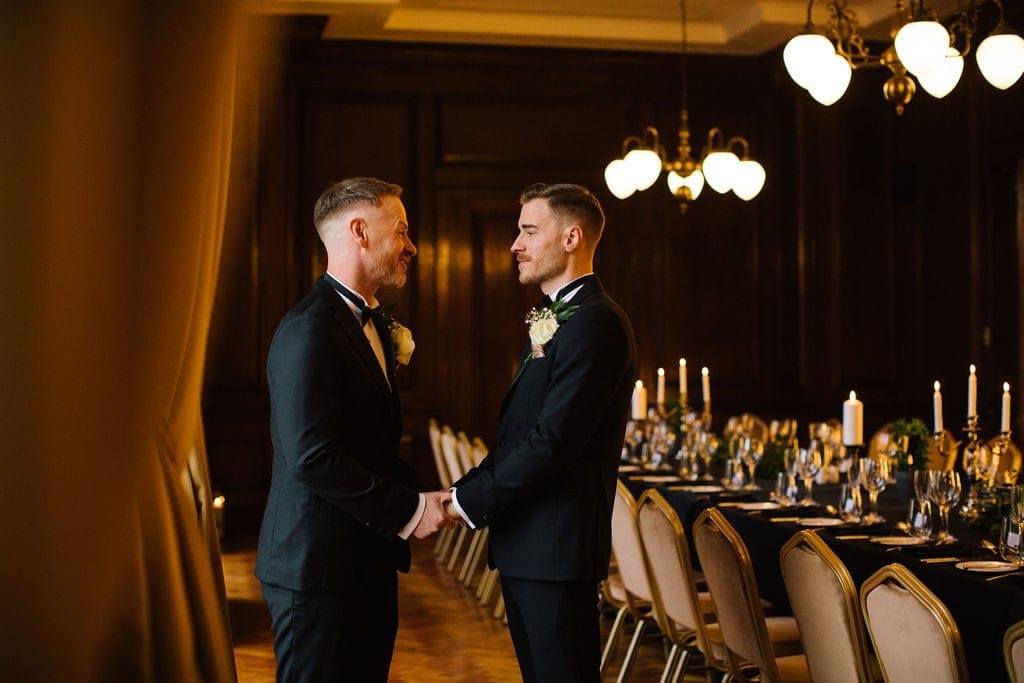
Key Responsibilities of Humanist Celebrants
Humanist celebrants like Karen Hewitt play a crucial role in creating a wedding ceremony that is not just a formality but a genuine celebration of the couple’s love and commitment to each other.
Their expertise and personalized approach ensure that each humanist wedding is a deeply meaningful, inclusive, and unforgettable experience for the couple and their guests. Here are some of their key responsibilities:
- Personalized Ceremony Creation: Celebrants take a personalized approach to each ceremony. They spend time getting to know the couple, understanding their relationship, values, and what makes their bond unique. This deep understanding allows them to tailor the ceremony to reflect the couple’s individual story and personalities.
- Inclusive Practices: Humanist celebrants ensure the ceremony is inclusive, welcoming, and accessible to all guests, respecting various cultures, backgrounds, and beliefs. Their approach is to create a ceremony space where everyone feels valued and connected to the celebration.
- Guidance and Support: From the initial planning stages through to the ceremony itself, celebrants provide guidance and support. They help couples navigate the process of choosing readings, vows, and rituals that are meaningful to them. Celebrants also offer advice on how to incorporate elements that honour their heritage, culture, or any other personal aspects they wish to include.
- Conducting the Ceremony: On the day of the wedding, the celebrant’s role is to conduct the ceremony, ensuring it runs smoothly and authentically reflects the couple’s wishes. This includes delivering a bespoke script that tells the couple’s story, guiding them through their vows, and officiating any chosen symbolic acts, such as handfasting or the lighting of a unity candle.
- Legal Considerations: While the legal aspect of marriage may require a separate civil ceremony in some regions, celebrants often provide information and guidance on how to fulfil these requirements, ensuring the couple’s union is recognized legally where applicable.
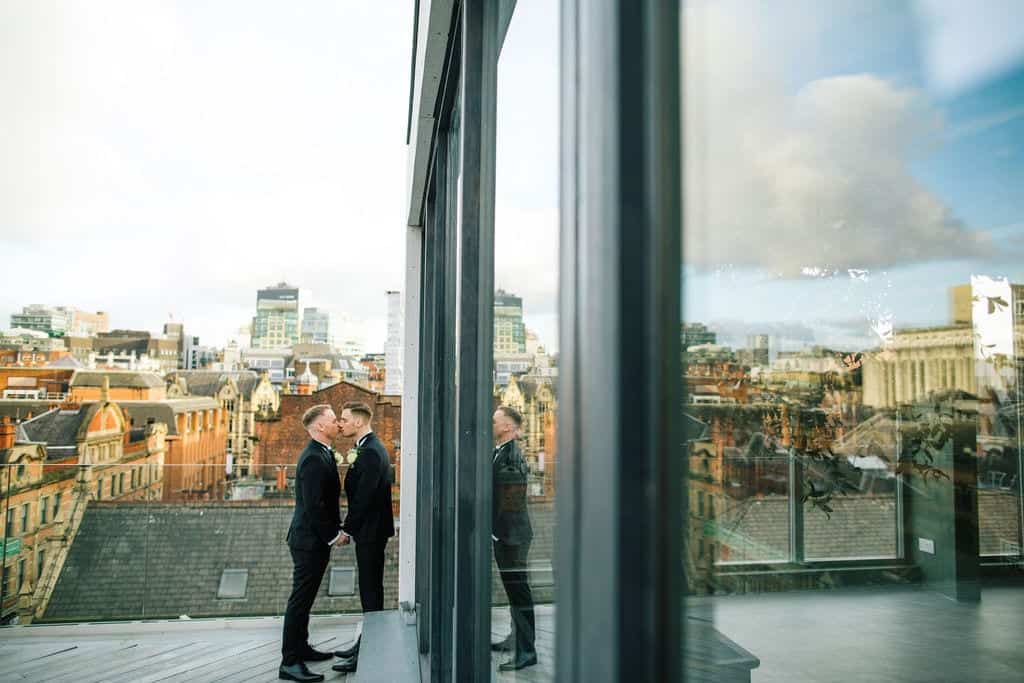
FAQs on Humanist Weddings
What is the average cost of a humanist wedding?
Costs can vary widely depending on the location, celebrant fees, and any additional elements you choose to include in your ceremony. It’s important to discuss fees with your chosen celebrant and budget for any venue, decoration, or logistical costs for your specific setting.
How far in advance should we plan our humanist wedding?
Planning at least 6-12 months in advance is advisable, especially if you need to secure a venue or a particularly sought-after celebrant. This also gives you ample time to personalize your ceremony and ensure all legal requirements are met.
Can we include religious elements in our humanist wedding?
While humanist weddings are non-religious by nature, many celebrants are open to incorporating elements that hold personal significance to the couple, including cultural or familial traditions. Pagan weddings mix well.
How do we handle unexpected challenges, such as weather for outdoor weddings?
Always have a backup plan. If your wedding is outdoors, consider renting tents or having an accessible indoor option. Communicate any changes or backup plans with guests in advance.
Additional Resources
For finding celebrants, inspiration for vows, and understanding legal requirements:
- Finding a Celebrant: Humanists UK offers a directory of accredited celebrants across different regions. Check their official website or the equivalent organization in your country for a list of celebrants. Humanists UK – Find a Celebrant
- Inspiration for Vows: Several online resources provide inspiration for writing your own vows. Consider looking at literature, poetry, or even songs that resonate with your relationship for inspiration. Offbeat Bride – Wedding Vows offers a collection of non-traditional vows for different types of ceremonies.
- Legal Requirements: The legal recognition of humanist weddings varies by location. For up-to-date information on legal requirements in your area, consult your local government’s website or a legal advisor. In the UK, Gov.uk – Marriages and Civil Partnerships provides information on the legal process for marriage and partnerships.
Humanist wedding guide
This guide aims to provide a thorough overview of planning a humanist wedding, from understanding the unique role of humanist celebrants to addressing logistical and legal considerations.
Head to our nontraditional wedding guide for everything you will ever need to know about planning an alternative wedding.
More blogs you will love!
- Wedding Snack Bar Ideas You’ll Wish You’d Thought Of First
- Unique Wedding Food Ideas for 2026 Weddings!
- Late-Night Wedding Snack Ideas That Actually Keep the Party Going
- 35 Trending Wedding Cake Ideas for 2026
- 30 Unique Wedding Ideas Trending in 2026
- Who Pays for What Now? Money Scripts for Modern Families







